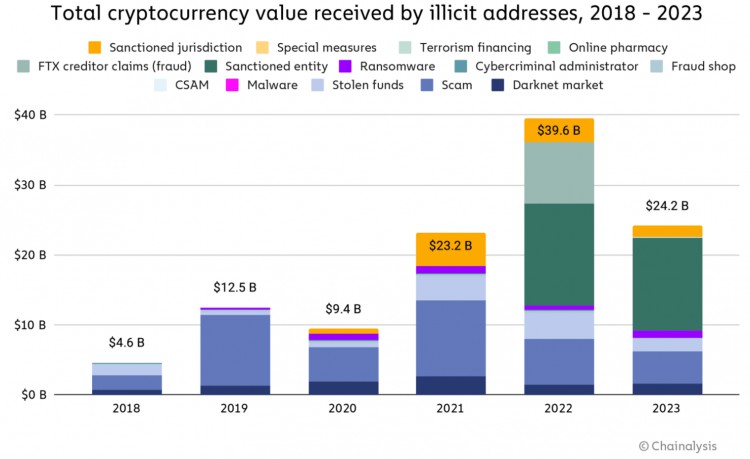时间:2024-03-05|浏览:297

In recent months, several well-known currency dealers and exchanges in Taiwan have faced law enforcement actions from government departments. Even though many cases are still under investigation, the ensuing media reports have deepened the general public's negative impression of the blockchain industry and cryptocurrency (virtual assets), and even believe that it is a tool specifically used for crime and fraud. .
However, these stereotypes are actually based on information gaps or prejudices to a considerable extent.
With the survey data released in recent years, it helps to clarify the myth of "cryptocurrency = fraud" and allows the public to more correctly understand the current status and facts of blockchain technology.
Cryptocurrency = crime? Data: Cryptocurrencies represent a minority
In recent years, when a piece of "cryptocurrency crime" news appears in the media, it always attracts more attention and discussion, because in the past, there were endless phone calls, text messages or online scams, which have become commonplace. According to the United Nations' estimate of the scale of criminal money laundering, the amount of money laundered that circulates internationally each year ranges from approximately US$800 billion to US$2 trillion, accounting for 2% to 5% of global GDP.
For these unscrupulous elements, any tool has the potential to be used as a tool for crime, fraud, and money laundering.
In other words, before the emergence of blockchain technology, there were such huge criminal activities in the world, and only a small number of criminals tried to use new technological tools. According to a report by independent third-party company Chainalysis, the total amount of funds stolen by cryptocurrency hackers and sent to illegal addresses in 2023 accounted for only 3% of global illegal money laundering activities.
 Cryptocurrency-mediated criminal financial flows
Cryptocurrency-mediated criminal financial flows
(Cryptocurrency Terrorist Financing Controversy: Chainalysis Beware of Exaggeration and Misunderstanding)
In the six years from 2018 to 2023, the amount of illegal activities accounted for an average of less than 0.5% of the total transactions on the entire chain, and it dropped to 0.34% in 2023. In other words, cryptocurrency is not the first choice of criminals’ tools, and its proportion in data is far lower than that of traditional financial crimes.
In fact, many people have discussed that the transparency and traceability of cryptocurrency are more helpful for crime prevention, but are inherently unsuitable as a criminal tool.
Similar conclusions can also be found in TRM Labs, another widely trusted blockchain data analysis company, which pointed out in its report that legal currency, especially the US dollar, actually still occupies a dominant position in illegal activities.

Cryptocrime exists! But there is no reason to give up eating because of choking
Even though the proportion of cryptocurrency used for illegal activities is still relatively small, it cannot be denied that it has indeed become an emerging medium for illegal activities. Not only money laundering and fraud, but also everything from theft, illegal payments to illegal business practices exist. Just like the existing traditional financial society, these long-standing criminal activities also use "blockchain" technology and "cryptocurrency" "Such a financial medium.
However, people have not abandoned such media and systems because criminals use cash and financial institutions to commit crimes; similarly, there is no reason to target a small number of criminals just because "blockchain" and "cryptocurrency" have been adopted on a large scale. elements to discriminate against and prohibit such neutral inventions.
(The picture below shows illegal cryptocurrency activities compiled by TRM Labs)
The development of the traditional financial system has gone from simple fraud and theft in the early days to facing the challenges of increasingly complex and transnational financial crimes. It goes through different stages, including the early days of basic regulation, the beginning of international cooperation, new challenges brought by the Internet and globalization, and modern methods of using technological innovation to deal with financial crime. This includes gradually strengthening anti-money laundering measures, promoting international cooperation, responding to online fraud and terrorist financing, and using innovations in financial technology and digital currency to strengthen supervision and prevention from the early 20th century to the present.
In different eras, the world has followed new developments to bring social progress; currently we are in an era of technology-led progress, as the popular "e/acc" (effective accelerationism) in Silicon Valley says: "In the era of technology, innovation And the power of capitalism should be used to its extreme to promote radical social change, even if it means completely overturning the current social order." They believe that overall, the ultimate development will do more good than harm.
(Learn more: What is “d/acc” by Vitalik? How does it differ from “e/acc” (effective accelerationism)?)
Cryptocurrency policing is a community-driven global movement
There is no doubt that "blockchain" and "cryptocurrency" have brought about new global financial markets and business opportunities, driving a new stage for diversified industries such as chip manufacturing, technological innovation, financial payment, art and entertainment. In 2024, the U.S. Securities and Exchange Commission (SEC) approved Wall Street financial institutions to create "Bitcoin spot ETFs." As of March 2, ten funds managed a total of US$61.7 billion in assets. The IBIT fund created by BlackRock is even more... Entering the list of tens of billions of dollars of ETFs in just a few months shows the charm of cryptocurrencies in a positive sense.
In order to promote the adoption of "blockchain" and "cryptocurrency", cryptocurrency-related industries and communities around the world are paying great attention to regulatory developments. Many industry giants are also willing to proactively cooperate with supervisory or law enforcement agencies to prevent illegal activities. and implement investor protection.
Successful Cases of "Cryptocurrency Crime Prevention" Cooperation between Enterprises and Governments
In the practical operation of crime prevention and control, it is crucial to cooperate with governments or law enforcement agencies with public power, of which Binance, the world's largest cryptocurrency exchange, is the most representative.
For example, Binance launched an anti-ransomware-bulletproof exchange program as early as 2020, working with the Ukrainian cyber police to arrest a large-scale cybercriminal organization with more than $42 million in illicit funds.
Binance has also cooperated with the Cyber Bureau of the South Korean National Police Agency, US law enforcement agencies, the Spanish Civil Guard, and the Swiss Federal Police in international investigations to arrest the rampant cybercrime group FANCYCAT, which was involved in a $500 million ransomware The attack was key to Binance’s expanded internal anti-money laundering detection and analysis capabilities.
Binance’s investigative team also assisted U.S. law enforcement agencies in freezing $4.4 million related to North Korean cybercrime organizations last year. In terms of anti-fraud activities, we cooperated with the Thai police and the U.S. Homeland Investigation Service (HSI) to detect the "Pig Killing Plate" fraud case, and seized US$27.7 million in illegal assets for more than 3,200 online fraud victims.
Industry players have invested a lot of resources to pave the way for regulatory maturity.
Since the formulation of a regulatory framework requires long-term planning and legislative procedures, compared with the light-speed development of financial technology, it is often slower than urgent. Therefore, the initiative and enthusiasm of private industry players are even more important in order to formulate standards and systems for the industry when regulations are not yet complete, to prevent bad money from driving out good money, and to pave the way for sustainable development of the industry in the future.
Enterprise self-organized crime prevention and investigation team
Take Binance, for example, which has established an industry-leading Financial Crimes Compliance (FCC) unit to respond to emerging tech illicit conduct. Its investigation team is composed of the industry's top investigators, blockchain analysts and former law enforcement personnel, covering a variety of professional fields such as technology, banking, law enforcement and intelligence, and 75% of its members are former law enforcement personnel, of which Includes background with the FBI, IRS, and Treasury Department. In total, more than 100,000 law enforcement requests from global law enforcement agencies have been processed in the past two years; in 2023, more than 51,600 suspicious activity reports (SARs) were completed.
New technology detection and prevention weapons
In order to ensure that they can continue to keep up with the dynamics of criminals, some businesses have already equipped themselves with blockchain analysis software and are conducting intelligence collection, data visualization and analysis; at the same time, they are also continuing to improve the implementation of the KYC (Know Your Customer) process to meet regulatory requirements. . Take Binance as an example. Not only is it one of the first exchanges in the world to implement mandatory KYC outside the United States, it also continues to cooperate with industry-leading KYC companies and blockchain tracking providers, such as the aforementioned Chainlaysis and TRM. Labs and Elliptic, among others, to ensure the security of their platforms. .
Public-private collaboration to jointly maintain the security of the Web3 ecosystem
As an emerging technology, blockchain cannot require supervisors or law enforcement personnel to quickly acquire corresponding professional knowledge and skills. Under this circumstance, the importance of public-private collaboration is self-evident. Take Binance as an example. The company is the first in the industry to launch the "Global Law Enforcement Training Program" to help law enforcement officers conduct virtual asset training courses and strengthen their ability to fight crime. Since its launch, the program has been held for nearly 200 times around the world. This course is unprecedented in terms of scale and scope.
A community-driven global Web3 governance movement
The global cryptocurrency community has made positive contributions to this field, not only through collaboration between industry players and governments. There are also white hat hackers, information security companies, infrastructure operators, product developers, researchers, media, community opinion leaders, etc., through supervision, product development, specification formulation, education, etc., they have served a wide range of sectors. Chain users gradually establish a good usage environment and move towards the ideal of widespread adoption.
"Understanding Cryptocurrency" starts with destigmatization!
Looking at the history of science and technology of mankind for nearly half a century, the emergence of technologies such as telephones, mobile phones, and the Internet has opened up different possibilities for society and greatly affected all walks of life. However, in the "flow"-oriented information age, we have lost the opportunity to view technological development "neutrally". If we only understand blockchain and cryptocurrency through one-sided and eye-catching information; it is a stigmatized industry. and communities may be suppressed and go underground, further encouraging the occurrence of illegal activities.
Therefore, when cryptocurrency is being abused, society should think about whether it should give up the contribution that this technology can bring to human society because of a small group of malicious elements? Just like we will not abandon communication software because social software is full of various scam messages; we will not deny the convenience of online shopping because we buy fake goods, but we will try our best to come up with various solutions. Helping the platform become cleaner and safer, the same is true in the blockchain field.
As an emerging technology and an industry in the early stages of development, the rapid development of cryptocurrency not only highlights the urgency of industry supervision and education, but also highlights the importance of the industry being able to continue to demonstrate high standards and maintain the integrity of the Web3 environment. Security cannot rely solely on a single company. Only when every industry participant works hard in their respective positions can they have the opportunity to jointly push the industry forward on the right path.
This article "Understanding Cryptocurrency" starts with destigmatization! Industry should not be equated with crime first appeared on Chain News ABMedia.
热点: BE

用戶喜愛的交易所

已有账号登陆后会弹出下载